Most babies at 9 to 10 months of age are exploring the world around them. Babies at this age may show fear of strangers. They may also stand up by pulling on furniture. And your child may point with fingers and try to eat without your help.

Try to read stories to your baby every day. Also talk and sing to your baby daily. Play games such as peekaboo.
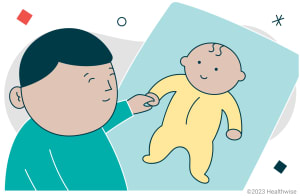
Praise your baby when they're being good. Use body language, such as looking sad, to let them know when you don't like their behavior.
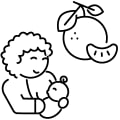
Feeding your baby
- If you breastfeed, continue for as long as it works for you and your baby.
- If you formula-feed, use a formula with iron. Ask your doctor when you can switch to whole cow's milk.
- Offer healthy foods each day, including fruits and well-cooked vegetables.
- Cut or grind your child's food into small pieces.
- Make sure your child sits down to eat.
- Know which foods can cause choking, such as whole grapes and hot dogs.
- Offer your child a little water in a sippy cup when they're thirsty.
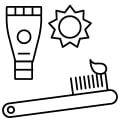
Practicing healthy habits
- Do not put your child to bed with a bottle.
- Brush your child's teeth every day. Use a tiny amount of toothpaste with fluoride.
- Put sunscreen (SPF 30 or higher) and a hat on your child before going outside.
- Do not let anyone smoke around your baby.
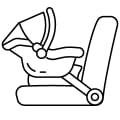
Keeping your baby safe
- Always use a rear-facing car seat. Install it in the back seat.
- Have child safety gates at the top and bottom of stairs.
- If your child can't breathe or cry, they may be choking. Call 911 right away.
- Keep cords out of your child's reach.
- Don't leave your child alone around water, including pools, hot tubs, and bathtubs.
- Save the number for Poison Control (1-800-222-1222).
- If your home was built before 1978, it may have lead paint. Tell your doctor.
- Keep guns away from children. If you have guns, lock them up unloaded. Lock ammunition away from guns.
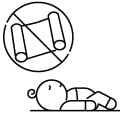
Keeping your baby safe while they sleep
- Always put your baby to sleep on their back.
- Don't put sleep positioners, bumper pads, loose bedding, or stuffed animals in the crib.
- Don't sleep with your baby. This includes in your bed or on a couch or chair.
- Have your baby sleep in the same room as you for at least the first 6 months and up to a year if possible.
- Don't place your baby in a car seat, sling, swing, bouncer, or stroller to sleep.

Getting vaccines
Make sure your baby gets all the recommended vaccines.
Follow-up care is a key part of your child's treatment and safety. Be sure to make and go to all appointments, and call your doctor if your child is having problems. It's also a good idea to know your child's test results and keep a list of the medicines your child takes.
Where can you learn more?
Go to http://www.healthwise.net/patientEd
Enter G850 in the search box to learn more about "Child's Well Visit, 9 to 10 Months: Care Instructions".
Current as of: October 24, 2024
Author: Ignite Healthwise, LLC Staff
Clinical Review Board
All Healthwise education is reviewed by a team that includes physicians, nurses, advanced practitioners, registered dieticians, and other healthcare professionals.

